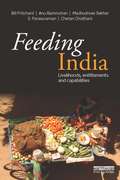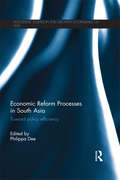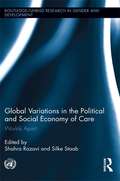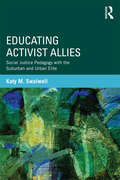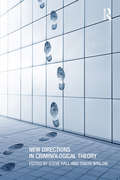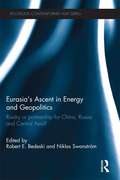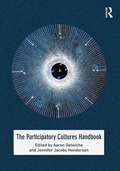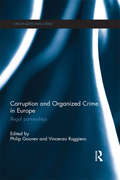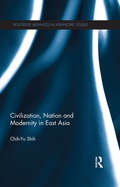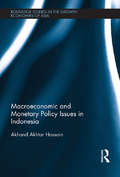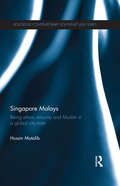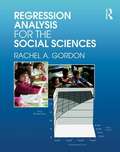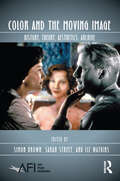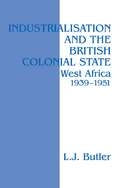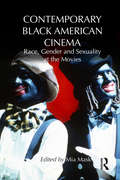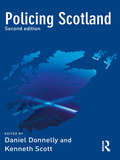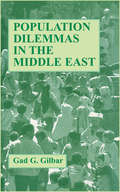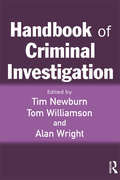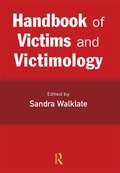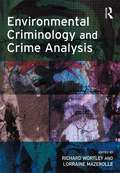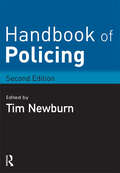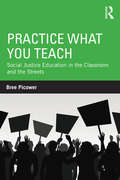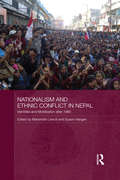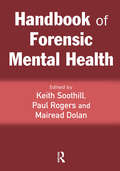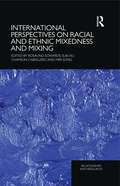- Table View
- List View
Feeding India: Livelihoods, Entitlements and Capabilities
by S. Parasuraman Bill Pritchard Madhushree Sekher Anu Rammohan Chetan ChoithaniFood security is one of the twenty-first century’s key global challenges, and lessons learned from India have particular significance worldwide. Not only does India account for approximately one quarter of the world’s under-nourished persons, it also provides a worrying case of how rapid economic growth may not provide an assumed panacea to food security. This book takes on this challenge. It explains how India’s chronic food security problem is a function of a distinctive interaction of economic, political and environmental processes. It contends that under-nutrition and hunger are lagging components of human development in India precisely because the interfaces between these aspects of the food security problem have not been adequately understood in policy-making communities. Only through an integrative approach spanning the social and environmental sciences, are the fuller dimensions of this problem revealed. A well-rounded appreciation of the problem is required, informed by the FAO’s conception of food security as encompassing availability (production), access (distribution) and utilisation (nutritional content), as well as by Amartya Sen’s notions of entitlements and capabilities.
Economic Reform Processes in South Asia: Toward Policy Efficiency (Routledge Studies in the Growth Economies of Asia)
by Philippa DeeWhile South Asia’s economic reform initiatives of the last two decades were often born in crisis, this alone does not account for their occurrence. This book looks at the processes and institutional arrangements behind these reforms, and analyses what lessons can be learnt about how South Asia can improve its policy efficiency. The book develops ideas about how to overcome the political restraints to reform by drawing on recent theories of political economy and policy learning. It tests these ideas against authoritative case studies of actual reform initiatives in South Asia, which illustrate processes and institutional arrangements that have helped South Asian governments to sustain reform efforts, even in the absence of a strong political base. This offers valuable lessons for the global economy as it moves into a phase of rebalancing, with the structural adjustments that this will require. The book goes on to identify weaknesses that could be addressed by South Asian national governments and regional forums. It is an important contribution to studies on South Asian Politics and International Political Economy
Global Variations in the Political and Social Economy of Care: Worlds Apart (Routledge/UNRISD Research in Gender and Development)
by Shahra Razavi Silke StaabCare work, both paid and unpaid, contributes to well-being, social development and economic growth. But the costs of providing care are unequally borne across gender and social class. Feminist scholarship on the gendered construction of welfare provisioning and welfare regimes has produced a conceptually strong and empirically grounded analysis of care, reinforcing the necessity of rethinking the distinctions between "the public" and "the private" as well as the links between them. Yet this analysis, premised on post-industrial contexts, does not travel easily to other parts of the world. Many of its core assumptions – about family structures, labor markets, state capacities, and public social provisioning – do not hold for a wider range of countries. Drawing on original research on the care economy in three developing regions (Africa, Asia, Latin America), this volume addresses a major empirical lacuna while facilitating a conversation across the North-South divide.
Educating Activist Allies: Social Justice Pedagogy with the Suburban and Urban Elite (Critical Social Thought)
by Katy M. SwalwellA CHOICE Outstanding Academic Title 2013! Educating Activist Allies offers a fresh take on critical education studies through an analysis of social justice pedagogy in schools serving communities privileged by race and class. By documenting the practices of socially committed teachers at an urban private academy and a suburban public school, Katy Swalwell helps educators and educational theorists better understand the challenges and opportunities inherent in this work. She also examines how students responded to their teachers’ efforts in ways that both undermined and realized the goals of social justice pedagogy. This analysis serves as the foundation for the development of a curricular framework helping students to foster an "Activist Ally" identity: the skills, knowledge, and dispositions necessary to negotiate privilege in ways that promote justice. Educating Activist Allies provides a powerful introduction to the ways in which social justice curricula can and should be enacted in communities of privilege.
New Directions in Criminological Theory
by Steve Hall Simon WinlowThis edited collection brings together established global scholars and new thinkers to outline fresh concepts and theoretical perspectives for criminological research and analysis in the 21st century. Criminologists from the UK, USA, Canada and Australia evaluate the current condition of criminological theory and present students and researchers with new and revised ideas from the realms of politics, culture and subjectivity to unpack crime and violence in the precarious age of global neoliberalism. These ideas range from the micro-realm of the ‘personality disorder’ to the macro-realm of global ‘power-crime’. Rejecting or modifying the orthodox notion that crime and harm are largely the products of criminalisation and control systems, these scholars bring causes and conditions back into play in an eclectic yet thematic way that should inspire students and researchers to once again investigate the reasons why some individuals and groups elect to harm others rather than seek sociability. This collection will inspire new criminologists to both look outside their discipline for new ideas to import, and to create new ideas within their discipline to reinvigorate it and further strengthen its ability to explain the crimes and harms that we see around us today. This book will be of particular interest to academics and both undergraduate and postgraduate students in the field of criminology, especially to those looking for theoretical concepts and frameworks for dissertations, theses and research reports.
Eurasia's Ascent in Energy and Geopolitics: Rivalry or Partnership for China, Russia, and Central Asia? (Routledge Contemporary Asia Series)
by Robert E. Bedeski Niklas SwanströmThe Sino-Russian relationship has experienced several permutations in recent decades as both states have undergone radical domestic changes, including the end of Soviet communism and the abandonment of Maoism. This volume brings together scholars to address the current status of Sino-Russian relations in the political, military, energy and trade sectors. In this comprehensive new volume, authors offer a detailed account on the both the historical context and current status of relations between Russia and China and the geo-political realignments in Eurasia. This analysis of the evolving relationship addresses global strategy, energy politics, national security, human security, and Central Asian links. Individual chapters examine key issues such as China’s economic ascendancy, military relations, the geostrategic position of Mongolia, Japan’s views and historical background. With authors representing a broad range of current active experts and researchers working in Europe, the US, Central Asia, China and Japan, this book offers a long-term and in-depth analysis of the relations and potential developments in both bilateral and international relations. This work will be of great interest to scholars of international relations, Asian security, and the Eurasian region.
The Participatory Cultures Handbook
by Aaron Delwiche Jennifer Jacobs HendersonHow did we get from Hollywood to YouTube? What makes Wikipedia so different from a traditional encyclopedia? Has blogging dismantled journalism as we know it? Our media landscape has undergone a seismic shift as digital technology has fostered the rise of "participatory culture," in which knowledge is originated, created, distributed, and evaluated in radically new ways. The Participatory Cultures Handbook is an indispensable, interdisciplinary guide to this rapidly changing terrain. With short, accessible essays from leading geographers, political scientists, communication theorists, game designers, activists, policy makers, physicists, and poets, this volume will introduce students to the concept of participatory culture, explain how researchers approach participatory culture studies, and provide original examples of participatory culture in action. Topics include crowdsourcing, crisis mapping, grid computing, digital activism in authoritarian countries, collaborative poetry, collective intelligence, participatory budgeting, and the relationship between video games and civic engagement. Contributors include: Daren Brabham, Helen Burgess, Clay Calvert, Mia Consalvo, Kelly Czarnecki, David M. Faris, Dieter Fuchs, Owen Gallagher, Clive Goodinson, Alexander Halvais, Cynthia Hawkins, John Heaven, The Jannissary Collective, Henry Jenkins, Barry Joseph, Christopher Kelty, Pierre Lévy, Sophia B. Liu, Rolf Luehrs, Patrick Meier, Jason Mittell, Sarah Pearce, W. James Potter, Howard Rheingold, Suzanne Scott, Benjamin Stokes, Thomas Swiss, Paul Taylor, Will Venters, Jen Ziemke
Corruption and Organized Crime in Europe: Illegal partnerships (Organizational Crime)
by Vincenzo Ruggiero Philip GounevIn Corruption and Organised Crime in Europe, Gounev and Ruggiero present a discussion of the relation between organized criminals and corruption in the EU’s 27 Member States. The book draws on research and scholarly work the editors carried out, respectively, within the Center for the Study of Democracy (CSD) in Bulgaria, and within academic institutions, as well as on behalf of the European Commission and the United Nations. Combining empirical data and theoretical debates, the book focuses on three main areas of the relationship between corruption and organised crime: public bodies, the private sector and criminal markets. It presents the findings of a recent research project carried out by the CSD on behalf of the European Commission, providing an analysis of the specific national contexts in which corruption and organized crime thrive. The essays also address institutional responses and policies, focusing particularly on how EU Member States attempt to sever the links between the official economy, the political sphere and organized crime. The second part of the book presents case studies, written by some of the foremost international experts on the subject matter, analysing corrupt exchange and criminal organisations, concentrating on specific European countries – Bulgaria, France, Greece, Italy, Russia, Spain and the UK. As the first comprehensive study of corruption and organised crime in the countries of the European Union, the book will be a valuable resource for students and scholars of criminology, sociology, law and international politics, as well policy makers and law-enforcement agencies.
Civilization, Nation and Modernity in East Asia (Routledge Advances in Asia-Pacific Studies)
by Chih-Yu ShihThis book explores the crisis of cultural identity which has assaulted Asian countries since Western countries began to have a profound impact on Asia in the nineteenth century. Confronted by Western 'civilization' and by 'modernity', Asian countries have been compelled to rethink their identity, and to consider how they should relate to Western 'civilization' and 'modernity'. The result, the author argues, has been a redefining by Asian countries of their own character as nations, and an adaptation of 'civilization' and 'modernity' to their own special conditions. Asian nations, the author contends, have thereby engaged with the West and with modernity, but on their own terms, occasionally, and in various inconsistent ways in which they could assert a sense of difference, forcing changes in the Western concept of civilization. Drawing on postmodern theory, the Kyoto School, Confucian and other traditional Asian thought, and the actual experiences of Asian countries, especially China and Japan, the author demonstrates that Asian countries’ redefining of the concept of civilization in the course of their quest for an appropriate postmodern national identity is every bit as key a part of 'the rise of Asia' as economic growth or greater international political activity.
Macroeconomic and Monetary Policy Issues in Indonesia (Routledge Studies in the Growth Economies of Asia)
by Akhand Akhtar HossainFollowing the acquisition of its sovereignty from the Netherlands in 1949, Indonesia experienced serious economic and political problems during the 1950s and 1960s, before entering a three-decade-long period of rapid economic growth. Hard-hit by the financial crisis of the late 1990s, Indonesia undertook a wide range of economic and financial reforms. These reforms served to prepare it well for the 2007-08 global financial crisis, through which Indonesia passed relatively unscathed. Drawing on empirical research, this book presents a comprehensive empirical study on the key macroeconomic relations and monetary policy issues in Indonesia. The book analyses monetary, fiscal and exchange-rate policies, looking at their interactions and impacts on the economy. It demonstrates how important macroeconomic management for monetary and financial stability is to sustained national economic growth and development. Data from the 1970s is compared and contrasted with 1950s data to analyse macroeconomic policies and issues in an historical context. Statistical and econometric techniques are juxtaposed with general empirical results to supplement informative discussion of macroeconomic and monetary developments. This book is a useful contribution to studies on macroeconomics and international development, as well as Southeast Asian studies.
Singapore Malays: Being Ethnic Minority and Muslim in a Global City-State (Routledge Contemporary Southeast Asia Series)
by Hussin MutalibThe Malay population makes up Singapore's three largest ethnic groups. This book presents holistic and extensive analysis of the 'Malay Muslim story' in Singapore. Comprehensively and convincingly argued, the author examines their challenging circumstances in the fields of politics, education, social mobility, economy, leadership, and freedom of religious expression. The book makes a significant contribution to the understanding of Muslims in Singapore, and the politics of a Malay-Muslim minority in a global city-state. It is of interest to researchers and students in the field of Singaporean studies, Southeast Asian Studies and Islam in Asia.
Regression Analysis for the Social Sciences
by Rachel A. GordonThe book provides graduate students in the social sciences with the basic skills that they need to estimate, interpret, present, and publish basic regression models using contemporary standards. Key features of the book include: interweaving the teaching of statistical concepts with examples developed for the course from publicly-available social science data or drawn from the literature. thorough integration of teaching statistical theory with teaching data processing and analysis. teaching of both SAS and Stata "side-by-side" and use of chapter exercises in which students practice programming and interpretation on the same data set and course exercises in which students can choose their own research questions and data set.
Color and the Moving Image: History, Theory, Aesthetics, Archive (AFI Film Readers)
by Simon Brown Sarah Street Liz WatkinsThis new AFI Film Reader is the first comprehensive collection of original essays on the use of color in film. Contributors from diverse film studies backgrounds consider the importance of color throughout the history of the medium, assessing not only the theoretical implications of color on the screen, but also the ways in which developments in cinematographic technologies transformed the aesthetics of color and the nature of film archiving and restoration. Color and the Moving Image includes new writing on key directors whose work is already associated with color—such as Hitchcock, Jarman and Sirk—as well as others whose use of color has not yet been explored in such detail—including Eric Rohmer and the Coen Brothers. This volume is an excellent resource for a variety of film studies courses and the global film archiving community at large.
Industrialisation and the British Colonial State: West Africa 1939-1951
by Lawrence ButlerTaking colonial policy towards West Africa as a case study, Butler shows that, during the 1940s, the Colonial Office evolved a policy of encouraging colonial industry as part of a broad programme of development intended to prepare colonies for independence.
Contemporary Black American Cinema: Race, Gender and Sexuality at the Movies
by Mia MaskContemporary Black American Cinema offers a fresh collection of essays on African American film, media, and visual culture in the era of global multiculturalism. Integrating theory, history, and criticism, the contributing authors deftly connect interdisciplinary perspectives from American studies, cinema studies, cultural studies, political science, media studies, and Queer theory. This multidisciplinary methodology expands the discursive and interpretive registers of film analysis. From Paul Robeson’s and Sidney Poitier’s star vehicles to Lee Daniels’s directorial forays, these essays address the career legacies of film stars, examine various iterations of Blaxploitation and animation, question the comedic politics of "fat suit" films, and celebrate the innovation of avant-garde and experimental cinema.
Policing Scotland
by Daniel Donnelly Kenneth ScottThis fully updated and expanded second edition of Policing Scotland takes account of recent developments in Scottish policing and criminal justice against the backdrop of a dynamic political landscape and looming fiscal constraints in public services. The book offers contributions from both academics and practitioners, and not only shows police at work in contemporary Scotland, but also gives some insight into those areas where policing is carried out by non-police people and organisations.It seeks to identify what it is about Scottish policing that is distinctly Scottish, the main characteristics of modern policing in Scotland, how these have developed over the recent past, and what they have become today. In answering these questions, the book analyses policing in Scotland in the context of the new and emerging ideas about the nature, purposes and methods of policing that are developing elsewhere in the world, and seeks to determine how far Scottish policing is maintaining its own traditions, or simply becoming a localised example of wider global trends.The second edition of this popular text introduces new chapters on crime investigation, police unionism, ethnic minorities, policing violence and forensic science, as well as incorporating a major new theme which seeks to explain how those responsible for policing Scotland set about dealing with current issues such as terrorism and organised crime. This book makes a significant contribution to the current debate on policing in Scotland, and as such is an essential text for academics and those interested in policing issues.
Population Dilemmas in the Middle East
by Gad G. GilbarThis study provides a general outline of Palestinian population growth between 1948 and 1987 and then focuses on the town of Nablus for a detailed analysis of the main aspects of Palestinian migration and high rates of natural increase. The author shows how the recession that struck the Arab oil economies in the early 1980s, by slowing down the migratory movement, shut off the valve that had afforded the Palestinians in the West Bank and Gaza relief from economic pressures.
Handbook of Criminal Investigation
by Tim Newburn Alan Wright Tom WilliamsonThis book provides the most comprehensive and authoritative book yet published on the subject of criminal investigation, a rapidly developing area within the police and other law enforcement agencies, and an important sub discipline within police studies. The subject is rarely out of the headlines, and there is widespread media interest in criminal investigation. Within the police rapid strides are being made in the direction of professionalizing the criminal investigation process, and it has been a particular focus as a means of improving police performance. A number of important reports have been published in the last few years, highlighting the importance of the criminal investigation process not only to the work of the police but to public confidence in this. Each of these reports has identified shortcomings in the way criminal investigations have been conducted, and has made recommendations for improvement . The Handbook of Criminal Investigation provides a rigorous and critical approach to not only the process of criminal investigation, but also the context in which this takes place, the theory underlying it, and the variety of factors which influence approaches to it. It will be an indispensable source of reference for anybody with an interest in, and needing to know about, criminal investigation. Contributors to the book are drawn from both practitioners in the field and academics.
Handbook of Victims and Victimology
by Sandra WalklateThe study of criminal victimisation has developed to the stage where by victimology is now regarded as a central component to the study of crime and criminology. This focus of concern has been matched by the growth and development of support services for the victim of crime alongside increasing political concern with similar issues. The central purpose of this book is to bring together leading scholars to produce an authoritative handbook on victims and victimology that gives due consideration to these developments. It will be concerned to reflect contemporary academic, policy, and political debates on the nature, extent and impact of criminal victimisation and policy responses to it. This book provides a overview of the importance of the role of the victim in the criminal justice system, with an analysis of the different theoretical perspectives within victimology. explores the relationship between victimisation and feminism with particular focus on domestic and sexual violence. analyses criminal justice policy and service delivery in relation to victims of crime, looking at developments within the UK and international perspectives. This handbook will be fundamental reading for students and academics studying victims and victimology and an essential reference tool for those working within the victim support environment.
Environmental Criminology and Crime Analysis
by Richard Wortley Lorraine MazerolleEnvironmental criminology is a generic label that covers a range of overlapping perspectives. At the core, the various strands of environmental criminology are bound by a common focus on the role that the immediate environment plays in the performance of crime, and a conviction that careful analyses of these environmental influences are the key to the effective investigation, control and prevention of crime. Environmental Crime and Crime Analysis brings together for the first time the key contributions to environmental criminology to comprehensively define the field and synthesize the concepts and ideas surrounding environmental criminology. The chapters are written by leading theorists and practitioners in the field. Each chapter will analyze one of the twelve major elements of environmental criminology and crime analysis. This book will be essential reading for both practitioners and undergraduate and postgraduate students taking courses in this subject.
Handbook of Policing
by Tim NewburnThis new edition of the Handbook of Policing updates and expands the highly successful first edition, and now includes a completely new chapter on policing and forensics. It provides a comprehensive, but highly readable overview of policing in the UK, and is an essential reference point, combining the expertise of leading academic experts on policing and policing practitioners themselves.
Practice What You Teach: Social Justice Education in the Classroom and the Streets (Teaching/Learning Social Justice)
by Bree Picower<p>Many teachers enter the profession with a desire to "make a difference." But given who most teachers are, where they come from, and what pressure they feel to comply with existing school policies, how can they take up this charge? Practice What You Teach follows three different groups of educators to explore the challenges of developing and supporting teachers’ sense of social justice and activism at various stages of their careers: White pre-service teachers typically enrolled in most teacher education programs, a group of new teachers attempting to integrate social justice into their teaching, and experienced educators who see their teaching and activism as inextricably linked. Teacher educator Bree Picower delves into each of these group’s triumphs and challenges, providing strategies and suggestions for all teachers along with her in-depth analysis. <p>By understanding all these challenges, pre-service and in-service teachers, along with teacher educators, will be in a better position to develop the kind of political analysis that lays the foundation for teacher activism. This timely resource helps prepare and support all educators to stand up for equity and justice both inside and outside of the classroom and offers a more nuanced portrait of what the struggle to truly "make a difference" looks like.</p>
Nationalism and Ethnic Conflict in Nepal: Identities and Mobilization after 1990 (Routledge Contemporary South Asia Series)
by Mahendra Lawoti Susan HangenIdentity movements, based on ethnicity, caste, language, religion and regional identity, have become increasingly significant in Nepal, reshaping debates on the definition of the nation, nationalism and the structure of the state. This book analyzes the rapid rise in ethnic and nationalist mobilization and conflict since 1990, the dynamics and trajectories of these movements, and their consequences for Nepal. From an interdisciplinary perspective, the book looks at the roots of mobilization and conflicts, the reasons for the increase in mobilization and violent activities, and the political and social effects of the movements. It provides a historical context for these movements and investigates how identities intersect with forms of political and economic inequality. Nepal’s various identity groups - Dalits, indigenous nationalities, Madhesis and Muslims - have mobilized to different extents. By examining these diverse movements within the same time period and within a unitary state, the book illuminates which factors are more salient for the mobilization of identity groups. Bringing together empirical contributions on key issues in identity production in a comparative perspective, the book presents an interesting contribution to South Asian studies as well as studies of nationalism and identity more broadly.
Handbook of Forensic Mental Health
by Paul Rogers Keith Soothill Mairead DolanThis is a comprehensive reference book on the subject of forensic mental health, looking at what forensic mental health is and its assessment, management and treatment. It focuses on key topics and the issues underpinning them in contemporary society. The book includes: an account of the historical development of forensic mental health, along with a description of the three mental health systems operating in the UK an in-depth analysis of the forensic mental health process and system, including an analysis of the different systems applied for juveniles and adults an examination of the main issues in forensic mental health including sex offending, personality disorders and addiction a breakdown of the key skills needed for forensic mental health practice. This is an authoritative reference book which will be a crucial text for practitioners, academics and students in the forensic mental health field.
International Perspectives on Racial and Ethnic Mixedness and Mixing (Relationships and Resources)
by Rosalind Edwards Miri Song Suki Ali Chamion CaballeroPeople from a ‘mixed’ or ‘inter’ racial and ethnic background, and people partnering and parenting across different racial and ethnic backgrounds, are of increasing political, public and intellectual interest internationally. Contributors to this interdisciplinary collection interrogate notions of mixedness and mixing, and challenge stereotypical assumptions. They advance debates in the field through illuminating the complexity of specific historical trajectories, administrative practices and lived experience. Recurrent themes woven throughout the chapters include: boundaries and categorisation in terms of administration and government, and also of lived experience the explicit and implicit politics of mixedness and mixing in terms of nation state interests, agenda and policies, as well as ‘on the ground’ social relations the ways that mixedness and mixing shift in meaning and implications across time and place, shaped by different national, regional and or local contexts. This volume shows that who is and is not ‘mixed’ is contested and understandings of mixedness and mixing, however conceived, need to be situated in the larger complex of ideas about race and its classification. International Perspectives on Racial and Ethnic Mixedness and Mixing is an invaluable book for students and scholars of race and ethnicity.
